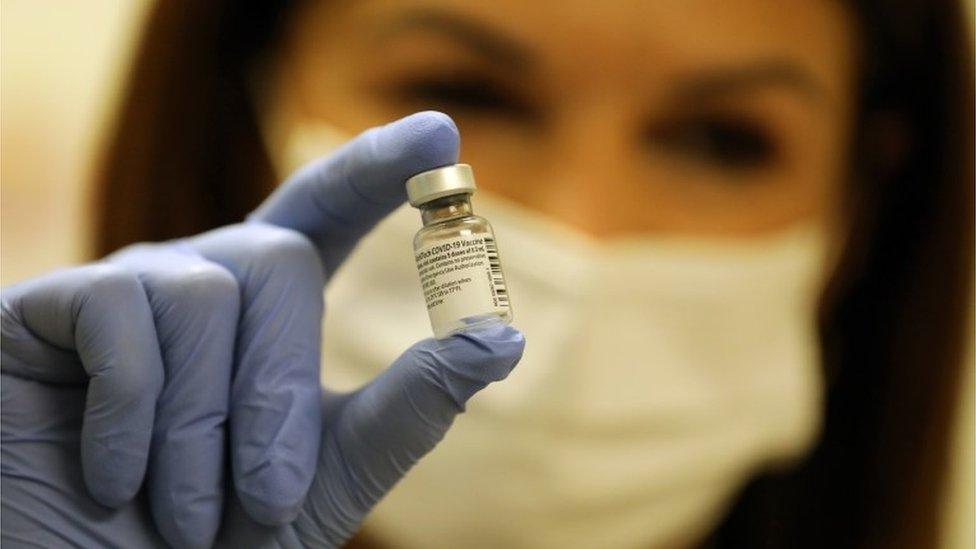Covid: When will I get my coronavirus vaccine?
- Published
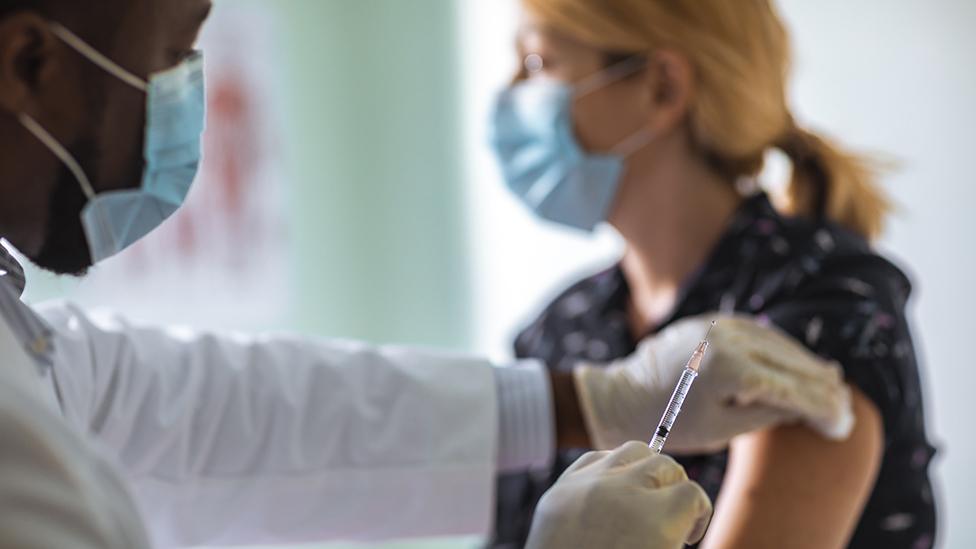
The new vaccine will make it easier to vaccinate more people in a greater number of settings
As the mass vaccination of the Welsh population continues apace, many people may be feeling hopeful there is finally light at the end of the tunnel.
The first people in Wales received the Oxford-AstraZeneca jab at the start of the year, shortly after thousands began to get the Pfizer vaccine.
There are hopes hundreds of thousands of us will be immunised with this, or other approved vaccines created by the likes of Moderna, over the coming weeks and months.
But with Covid vaccine supplies set to be delayed in April, and Wales expected to receive 250,000 fewer Oxford-AstraZeneca jab doses, when can you expect to get the jab, and what does it mean for how we live our lives?
More than 1,380,000 people have had a first dose of a vaccine in Wales, while more than 410,000 have had the full vaccine course.
Almost 60% for those in their 50s have had their first jab, with 41.2% of 75 to 79-year-olds and 44.6% of 70 to 74-year-olds now having had both doses.

When will I get the vaccine?
It's the question on everyone's lips... when will I get the call to go and get one of the vaccines?
For most of us, when we will receive either of the jabs depends on how high risk we are of becoming severely ill if we contract coronavirus.
Despite concerns delays would affect the vaccine rollout, the Welsh government still aims to vaccinate Wales' priority groups by mid-April and offer all adults a jab by the end of July.
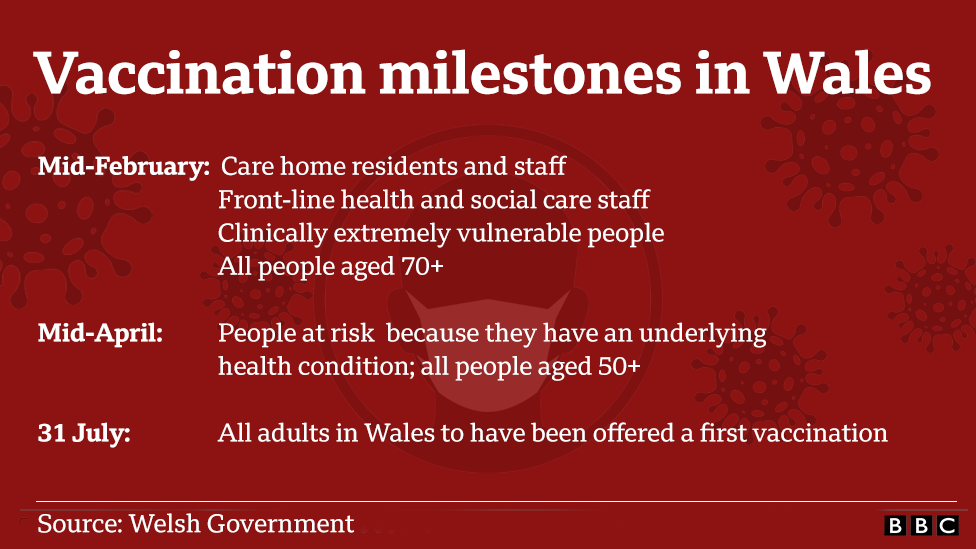
But who is in line first?
Those classed as highest risk have been getting the jab first - so the care home residents, elderly, and those classed as "clinically vulnerable", were immunised during the first phase of the rollout.
A priority list was drawn up by officials, with care home residents and staff - about 40,250 - first in line.
Then about 326,000 people over the age of 80, and those who work as frontline NHS and social care workers, were to be prioritised. Followed by those over 70 or classed as clinically extremely vulnerable - those who are shielding.
People will then be given it depending on age and medical conditions.
And the hope is that within weeks anyone over the age of 50 or who is aged over 16 and has an underlying medical condition which puts them at greater risk of getting severely ill, will have been vaccinated.
The underlying medical conditions for this vaccination category are:
Chronic respiratory disease, including chronic obstructive pulmonary disease (COPD), cystic fibrosis and severe asthma
Chronic heart disease (and vascular disease)
Chronic kidney disease
Chronic liver disease
Chronic neurological disease, including epilepsy
Down's syndrome
Severe and profound learning disability
Diabetes
Solid organ, bone marrow and stem cell transplant recipients
People with specific cancers
Immunosuppression due to disease or treatment
Asplenia and splenic dysfunction
Morbid obesity
Severe mental illness
The UK will give both parts of the Oxford and Pfizer vaccines 12 weeks apart, having initially planned to leave 21 days between the Pfizer jabs.
The UK's chief medical officers defended that plan, after criticism from a doctors' union.
How do the vaccines work?
There are two Covid-19 vaccinations being given in Wales, the Oxford-AstraZeneca and the Pfizer-BioNTech jabs.
But in April, the first Moderna vaccines - the third vaccine of seven ordered - are due to arrive in the UK, which is lined up to receive 17 million doses.
Like the Pfizer-BioNTech and Oxford jabs, the Moderna jab is given in two doses several weeks apart.
Laura Foster explains why the Oxford vaccine matters
The Oxford vaccine is made from a genetically-engineered virus that causes the common cold in chimpanzees, and has been altered to make it like coronavirus.
After the jab the immune system triggers antibodies to fight it, which means that if the person contracts Covid again they have "exactly what they need to fight it off", the BBC's Laura Foster says.
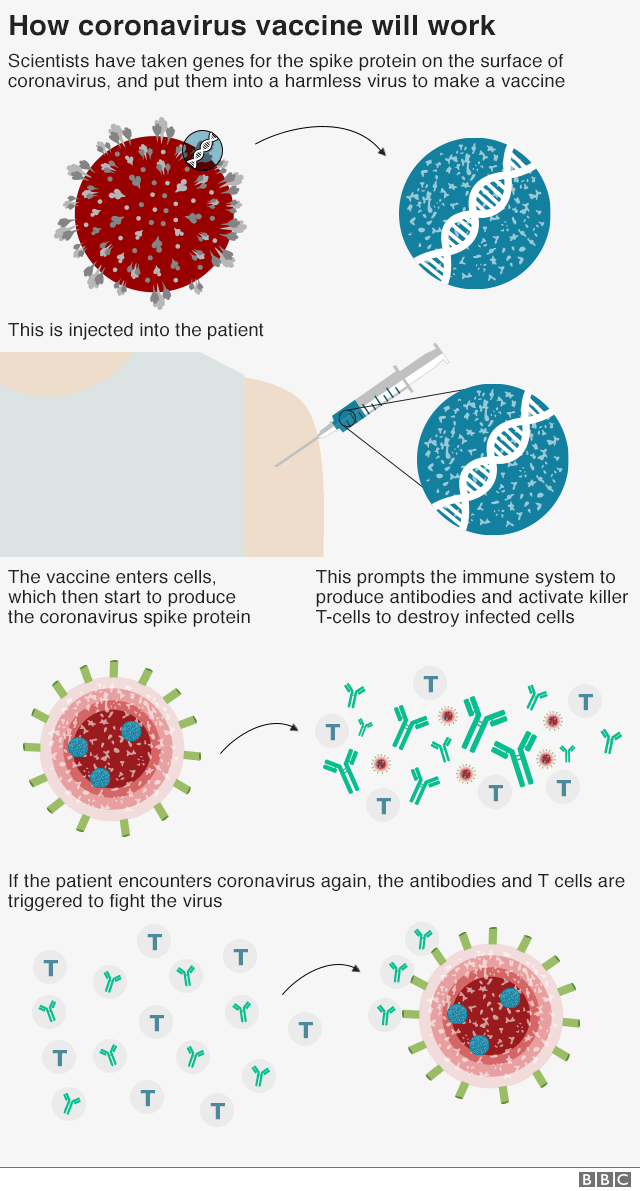
Am I protected straight away?
The simple answer is no.
People are being warned not to use the vaccine as a reason to return to normal, as there is no evidence you cannot catch Covid-19 or spread it once you have had the jab.
Officials are urging people to stick to the rules, regardless of whether they have had the vaccine. So that means social distancing, wearing masks and continuing with hygiene measures.
How will the new Pfizer vaccine work?
Also you need two doses to get the maximum protection.
The biggest question - how long immunity lasts - will take months or potentially years to answer.
Where's my nearest vaccination centres?
You will be able to get the Oxford jab - which is easier to store - at GP surgeries and community vaccination centres, and have it administered by district nurses.
Some people may also get their jab administered by an optician or dentist, to speed up the rollout of the vaccine, and there may be the potential to deliver it to pharmacies.
In some rural or hard-to-reach communities, people may get their injection in a mobile vaccination centre, and proposals are in place for military medics, retired NHS workers, members of the Red Cross and St John Ambulance to help with the rollout.
Derek Games says he was "shocked" to get a phone call asking him to go to the surgery for the jab.
But, health boards and GP surgeries are urging people not to contact them for information about getting the vaccine after being inundated with inquiries.
In turn, people will be sent a letter and your GP will contact you to offer you the jab and an appointment.
Do 'hotspot' areas get prioritised?
Some areas of Wales have much higher case rates of the virus than others.
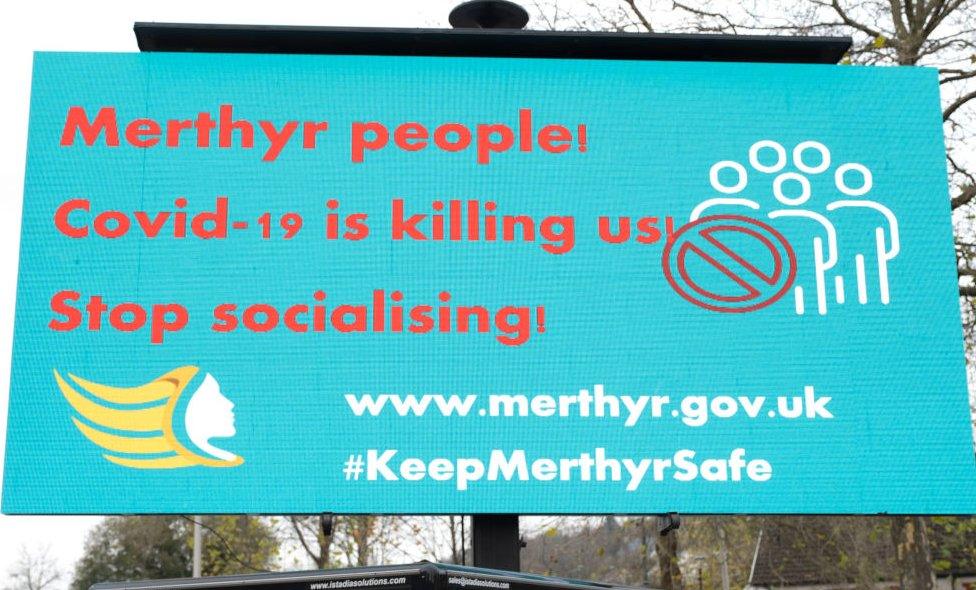
But those living in hotspot areas are not getting the vaccine as a priority, as there is no evidence the jab stops transmission of the virus from person to person.
Each health board will be allocated a share of doses depending on how many individuals in their area are classed as the most vulnerable to becoming severely ill from the virus.
What about children?
Children are not currently due to be vaccinated, and the vaccines have not been tested on children.
The risk that children will become gravely ill from coronavirus has been described as "tiny".
I'm a key worker so when will I be vaccinated?
Care home workers and NHS front-line staff are among the first in line to get the vaccines, as the health service responds to the pandemic.
But there have been calls for other front-line key workers - who are face to face with the public on a daily basis - to also be prioritised.
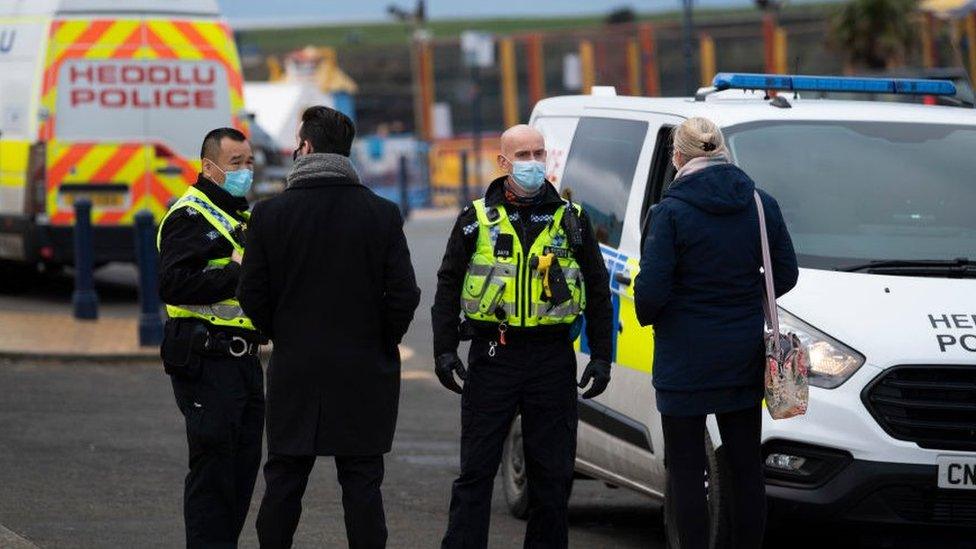
Those representing police say officers have been spat at and attacked trying to enforce coronavirus rules
Currently the priority list does not include other key workers, such as teachers, police officers and firefighters, as well as other non-NHS workers.
Teachers and school staff who work with young people who are clinically vulnerable have however been added to the priority list following UK-wide advice.
They will have to wait and be immunised depending on what age and risk category they fall into.
This is because there is no evidence the vaccines do not stop people catching Covid-19, instead protecting them from the more severe symptoms.
Can I pay to be vaccinated sooner?
No - this vaccine is being rolled out free to people via the NHS.
You cannot jump the queue by paying for it, but there should be plenty of vaccine to go round.
How much of the vaccine will Wales get?
The UK has ordered 100 million doses of the Oxford-AstraZeneca vaccine - enough to vaccinate 50 million people.
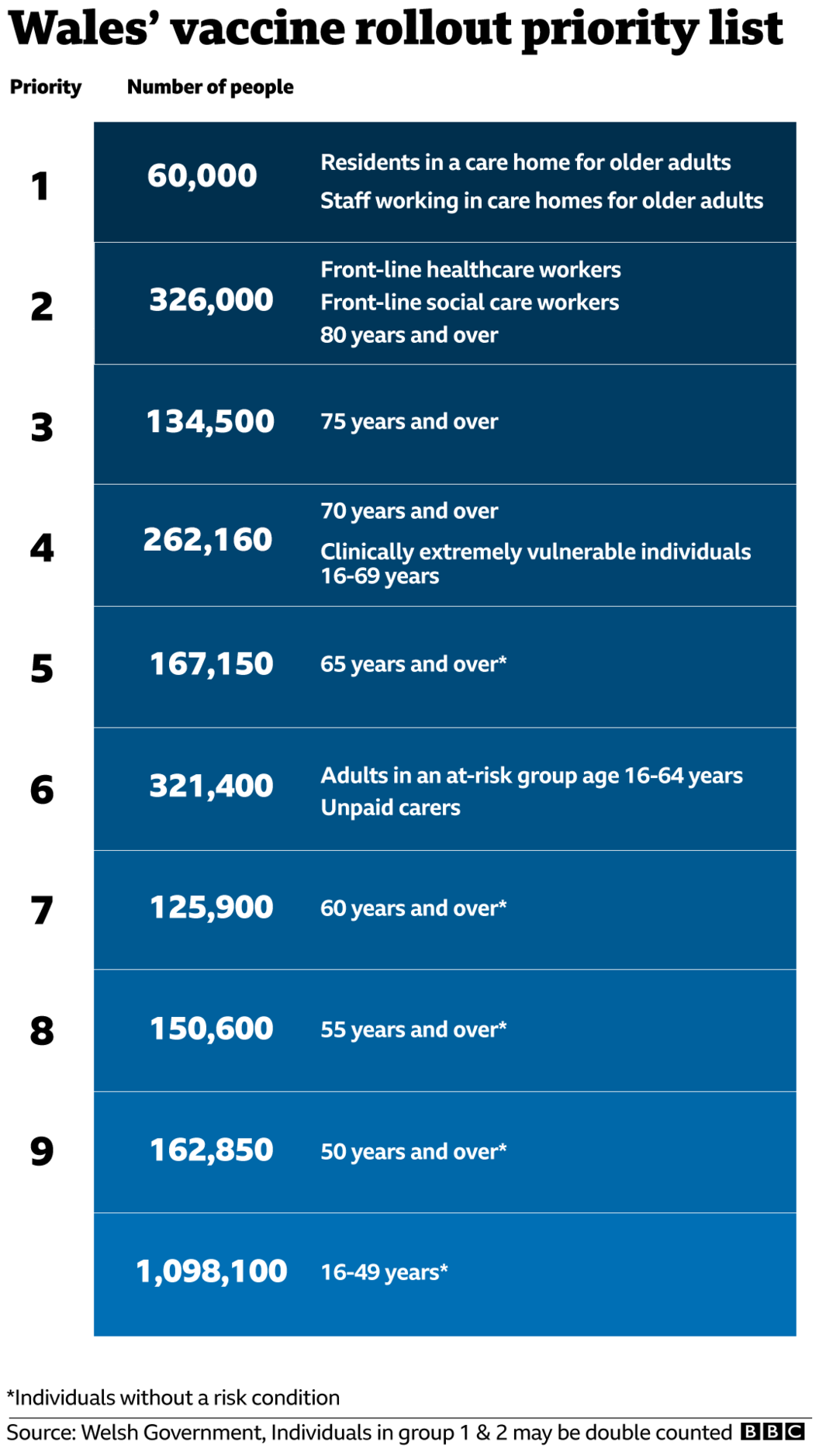
While the exact amount Wales will receive has not yet been disclosed, this would amount to roughly five million doses or enough to vaccinate just below 2.5 million people if it was given as a percentage of population.
What if you don't want the vaccine or you are pregnant?
Those who were pregnant or breastfeeding had been advised not to have the Pfizer-BioNTech vaccine, due to a lack of information about its effects.
But with the new vaccine there has been a relaxation of this, with experts saying it is more a matter of personal choice whether they have the jab.
The Medicines and Healthcare products Regulatory Agency (MHRA) is now advising that those with food allergies can have the vaccine - but not those with allergies to ingredients in the dose.
If you do not want the vaccine, BBC Wales understands you will not just get offered it once. There will be chances to change your mind and have the jab in the future.
What are the challenges?
Both vaccines present logistical challenges for the Welsh NHS, such as how they will be distributed and how quickly.
With the Pfizer vaccine the main issue has been that it has to be stored at -70c, making it hard to distribute in community and care home settings.
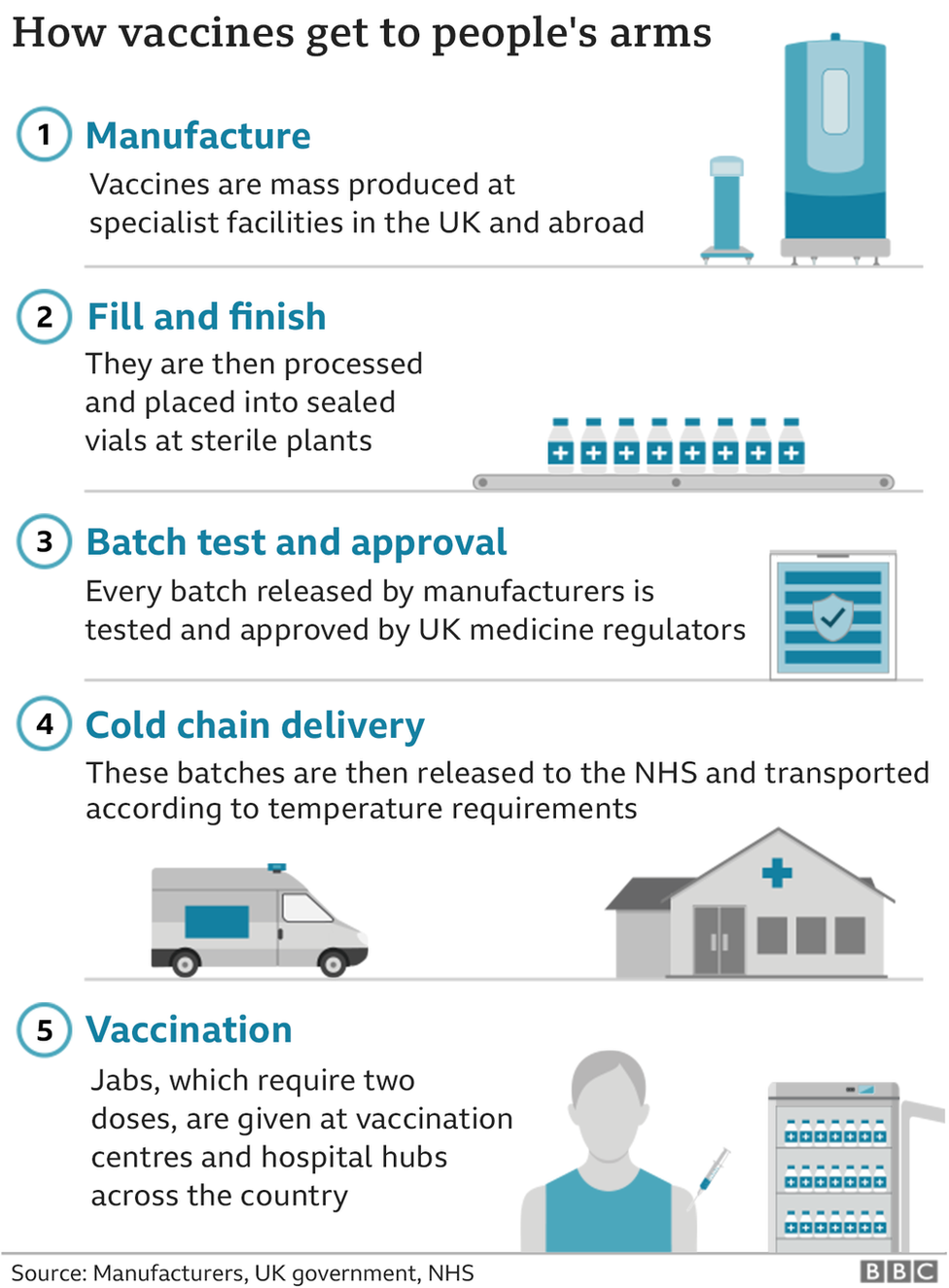
While this is not an issue for the Oxford-AstraZeneca vaccine, meaning it is easier to rollout, one challenge is that within each vial there are up to 10 doses of the vaccine, which has a short shelf life of about six hours.
After the first dose is administered, the second needs to be given within four to 12 weeks.
What if I have already had my first vaccine?
More than 1,380,000 people in Wales have had a first dose of a vaccine, and more than 400,000 people have had their second dose.
Covid vaccine safety: How does a vaccine get approved?
Based on advice from the Joint Committee on Vaccination and Immunisation, the aim is to give as many vulnerable people some protection from Covid-19, irrespective of the jab they are given.
There has been criticism over the delay for the second dose from medical professionals.
But experts believe the longer wait between doses will allow them to give more people the initial dose - believed to provide a higher level of protection - before giving people the second dose, for longer term immunisation.
When will life get back to normal?
Despite the vaccine news, an end to us all walking around without masks and being able to hug our friends and family normally seems a long way off still.
First Minister Mark Drakeford has warned Wales was not likely to return to normality in 2021.
- Published11 January 2021
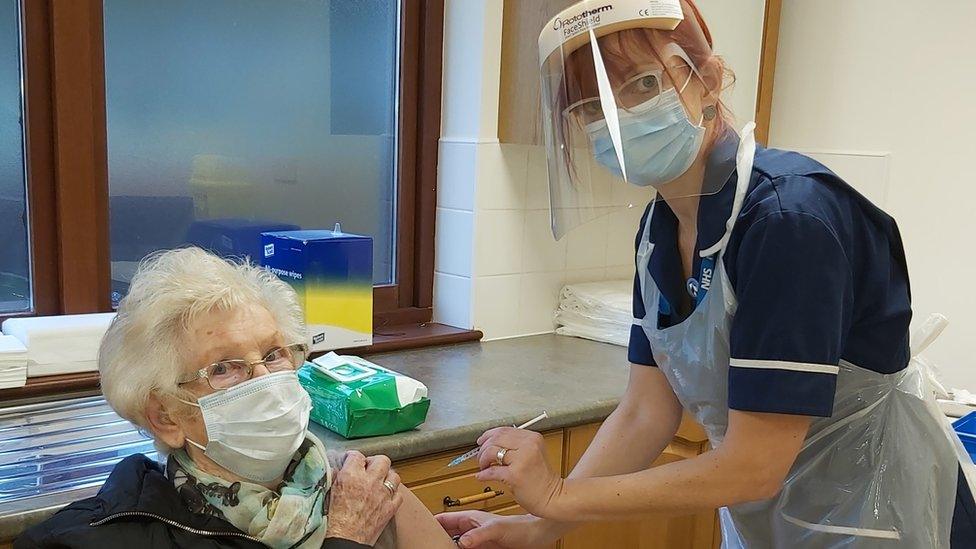
- Published11 January 2021
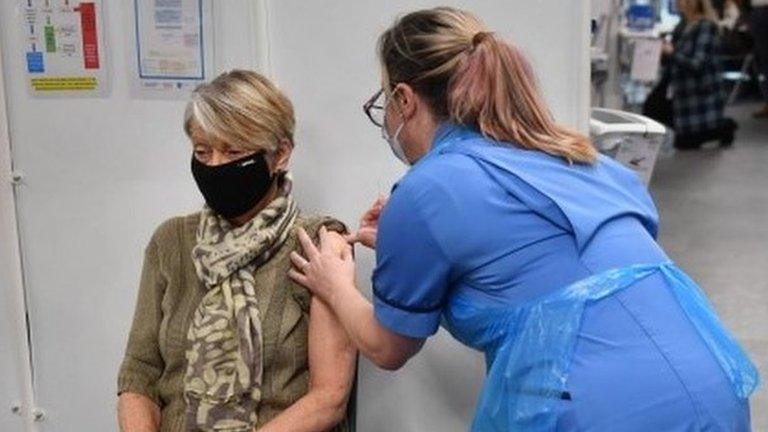
- Published10 January 2021
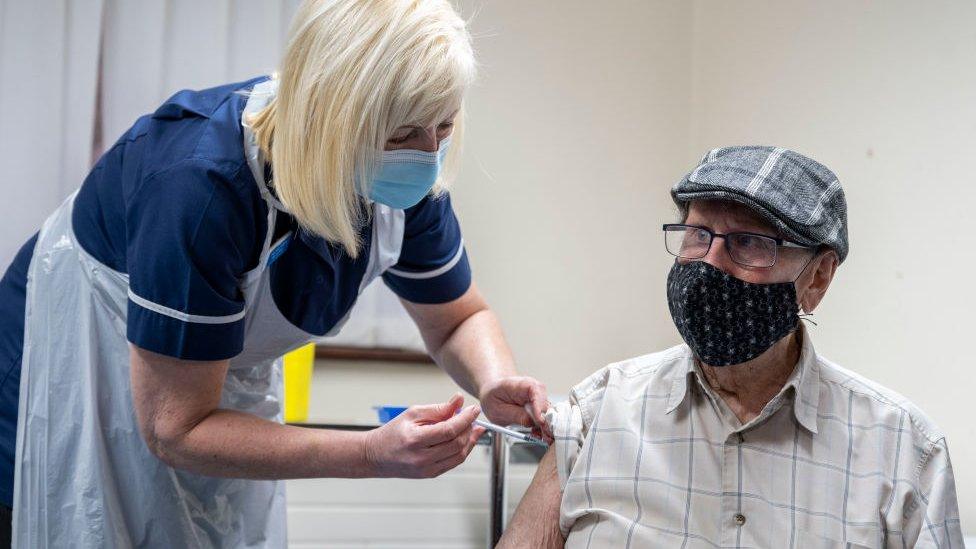
- Published9 January 2021
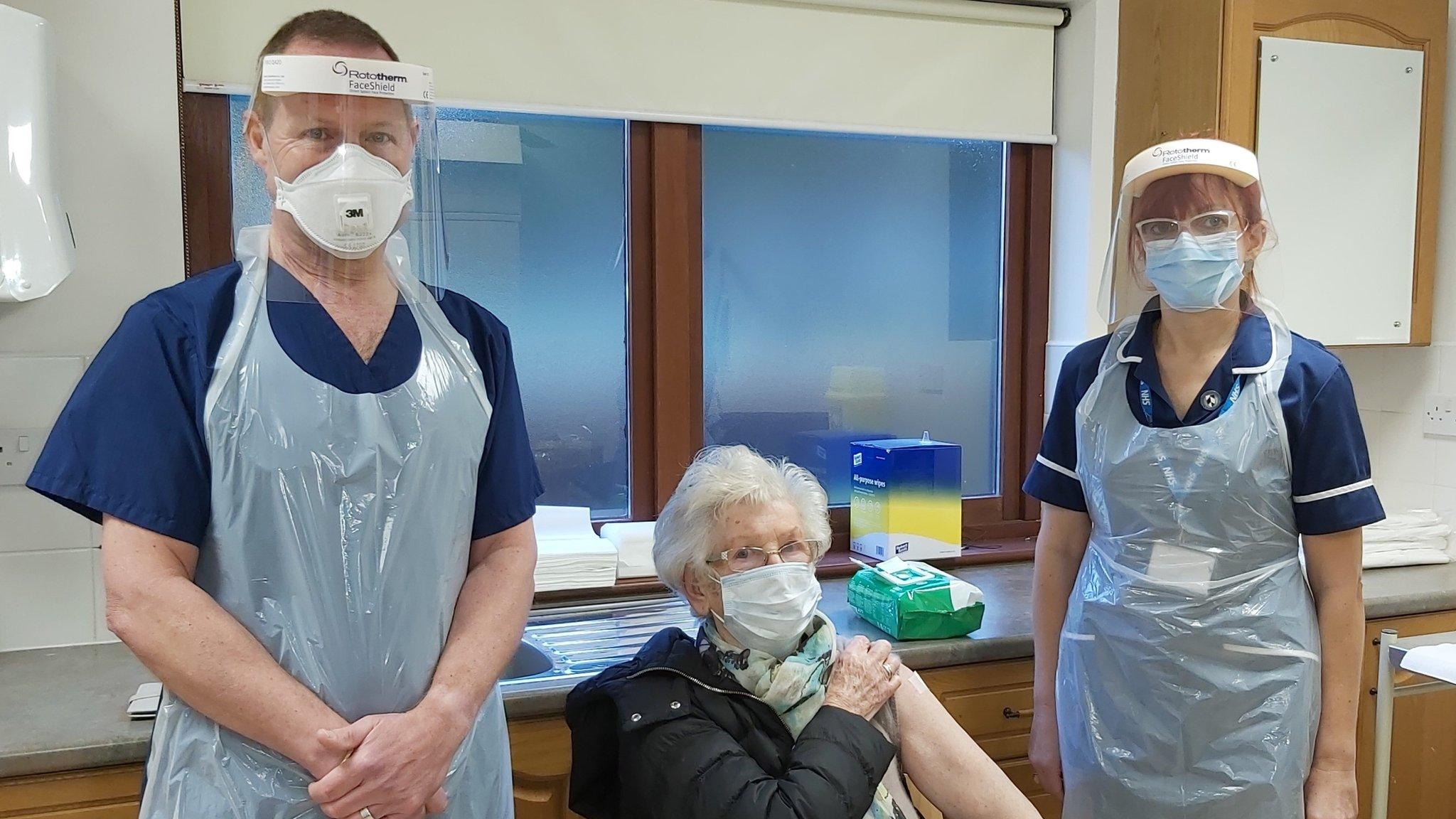
- Published7 January 2021
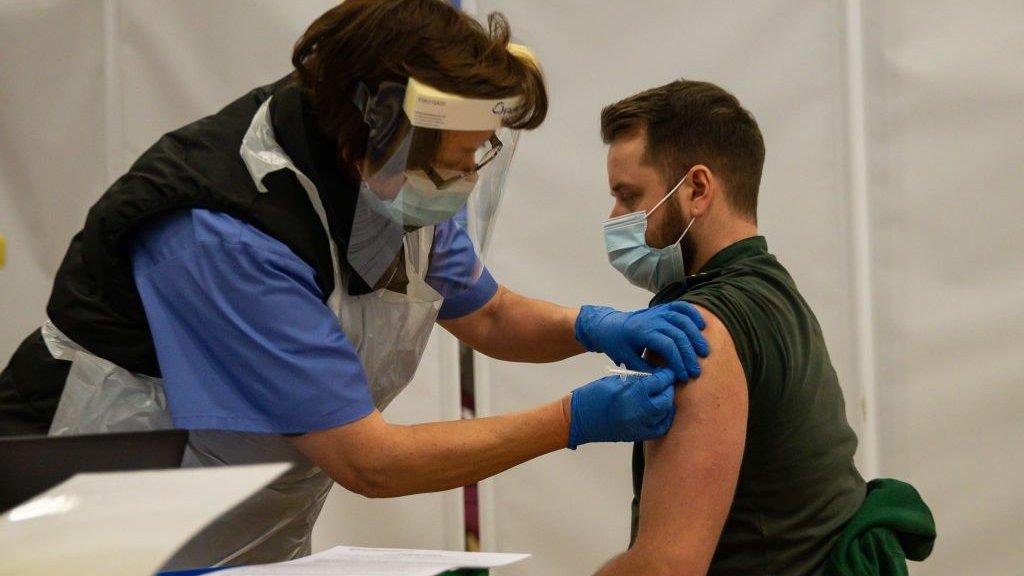
- Published4 January 2021
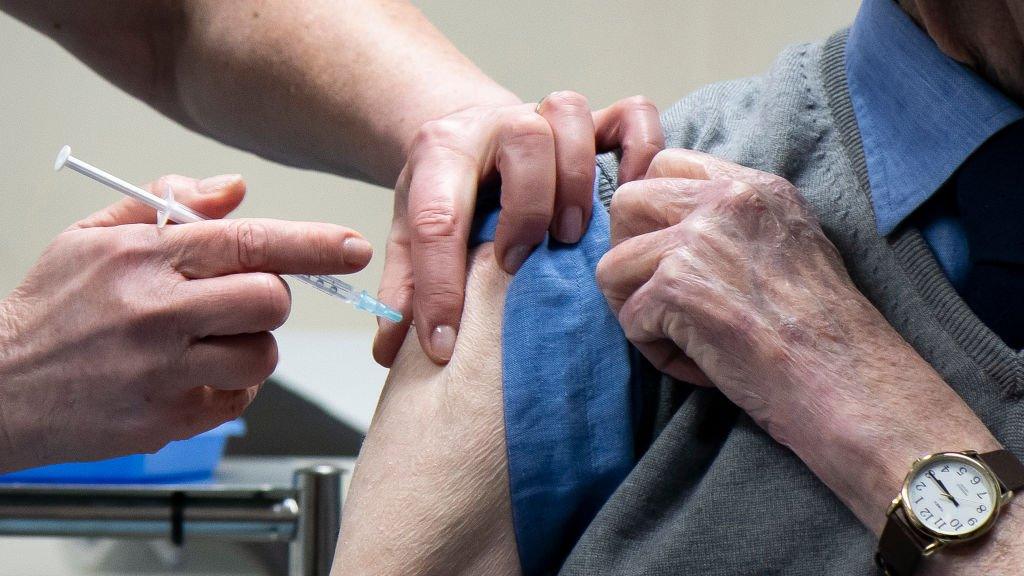
- Published1 January 2021
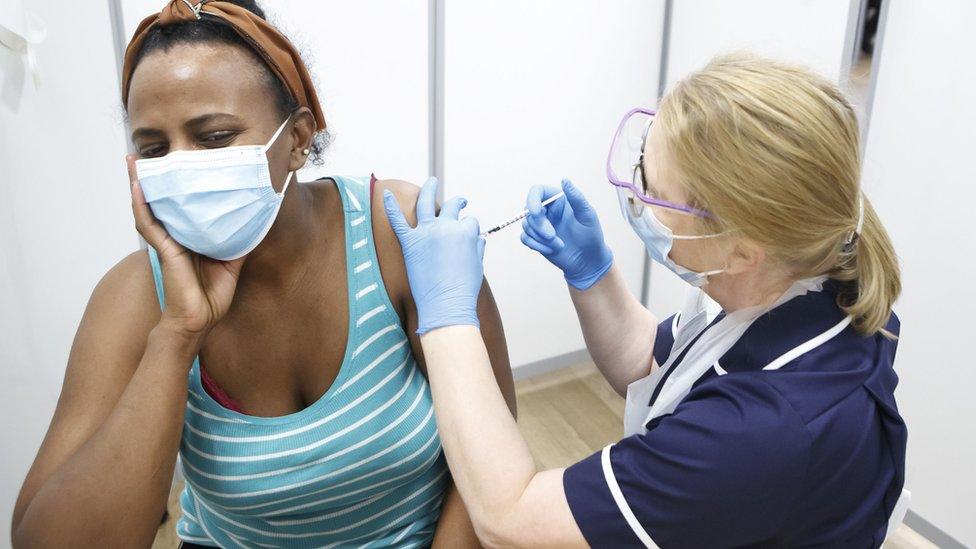
- Published8 December 2020
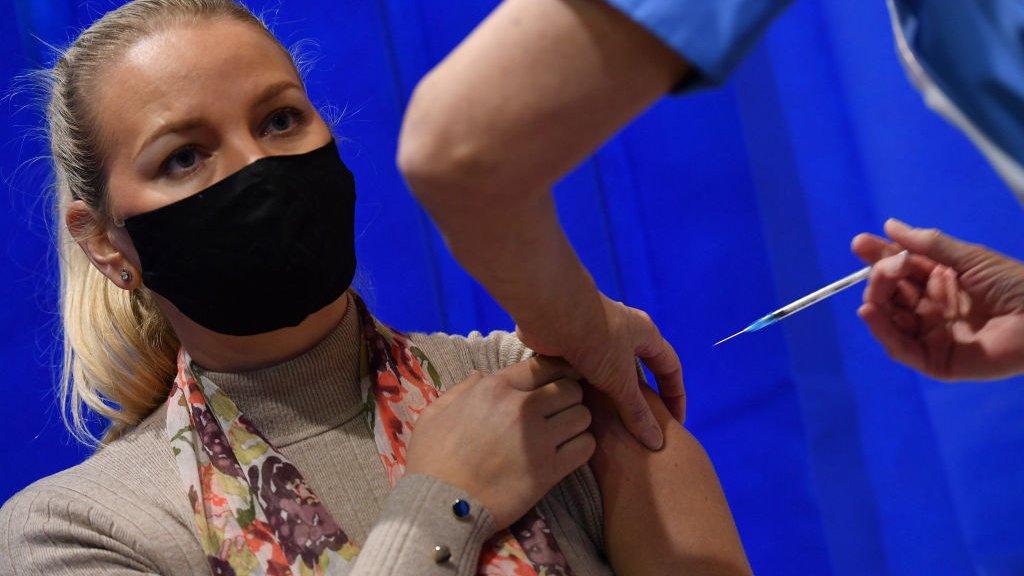
- Published14 December 2020
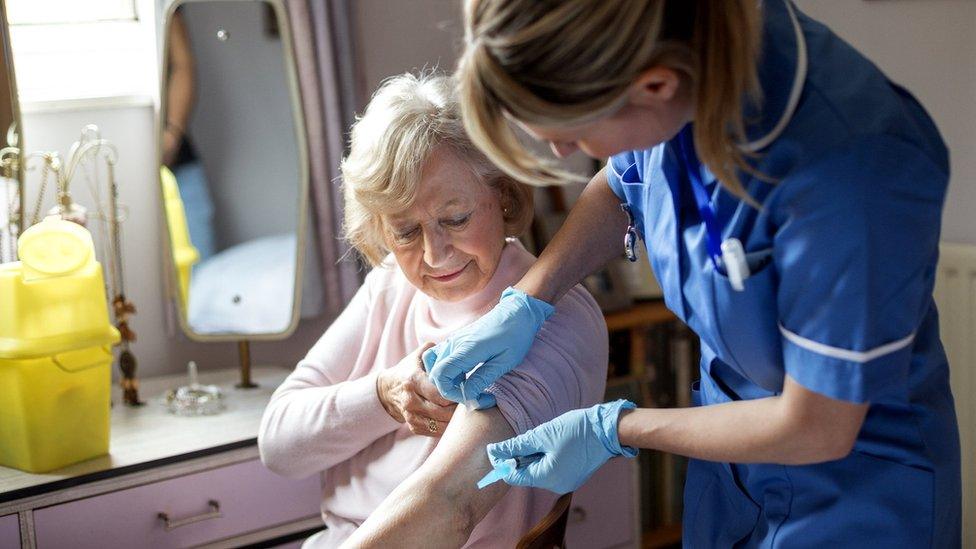
- Published22 December 2020
